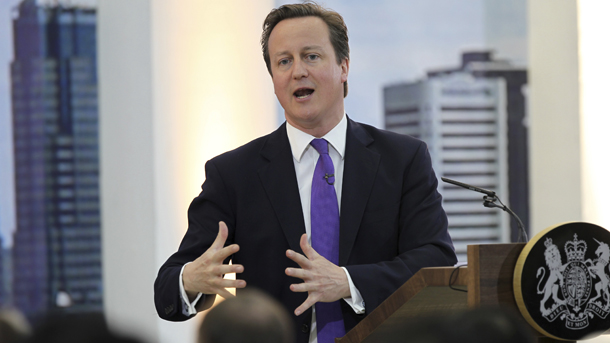UK Prime Minister David Cameron has joined calls for an easing of punitive economic sanctions against Burma as he prepares to touch down for an historic visit to the military-dominated nation.
Cameron’s visit on Friday will be the first by a major Western leader to long-isolated Burma for 50 years, and comes in the wake of tentative democratic reforms by the Naypyidaw administration.
The Conservative politician has been visiting Asia as part of a trade tour to drum up business for British firms, and he has already signed significant deals in Japan and Indonesia.
The 45-year-old decided to pay a visit to the former British colony after the widely praised April 1 by-elections secured 43 seats for pro-democracy icon Aung San Suu Kyi’s main opposition National League for Democracy party.
The move has seen a litany of Western powers announce an easing of crippling international trade restrictions on Burma, but until now the UK premier has refused to make any such concessions.
“If Burma moves towards democracy then we should respond in kind, and we should not be slow in doing that,” Cameron told BBC Radio Five Live during an interview on Thursday. “But first I want to go and see for myself how things are going.”
And Cameron was quick to lavish praise on those who had pushed for reform in Burma during a speech to students in the Indonesian capital Jakarta.
“So let us pay tribute to those who for decades at huge personal cost to themselves have fought for that freedom and fought for that reform, not least, of course, the inspirational Aung San Suu Kyi,” he said.
“Let us also pay tribute to the leadership of President Thein Sein and his government, which has been prepared to release political prisoners, to hold by-elections and to legalise political parties that had previously been outlawed.
“And let us show that when they have the courage to reform, we have the courage to respond.”
Burma, also known as Myanmar, is slowly emerging from the international wilderness after years of Western sanctions due to human rights abuses perpetrated during more than half-a-century of military rule.
Former junta generals ceded power to a nominally civilian administration a year ago, but concerns remain regarding the widely condemned 2008 Constitution which guarantees 25 percent of parliamentary seats for the military.
There are also reservations about the residual power of the commander-and-chief of armed forces to cease control in times of “national emergency.”
However, in recent weeks both large and small multinational firms have set up shop in the former capital Rangoon in eager anticipation of the end of sanctions and the huge investment opportunities on offer.
Burma has a population of 64 million people and huge natural resources of lumber, gemstones and fossil fuels, as well as being strategically placed between the booming markets of India, China and Southeast Asia.
The US announced an easing of economic sanctions on April 4 with the subject up for review by the European Union on April 23, and it appears that the UK is now determined not to be left behind.
“In a world where there are many dark chapters, there is one potential chapter of light in Burma where there does seems to be a prospect of the flowering of more democratisation and freedom. We should be sceptical. We should be questioning it and not naïve,” Cameron told a press conference in Kuala Lumpur on Thursday.
“But its not just the Indonesian President who thinks [Burmese President Thein Sein] is sincere, its not just the Malaysian Prime Minister who takes that view. Aung San Suu Kyi herself who spent so many years in such a lonely, but powerful resistence believes [Thein Sein] is acting in good faith.
“Just as Britain played a leading role in the EU on imposing sanctions, we should not be backwards in our response.”
















